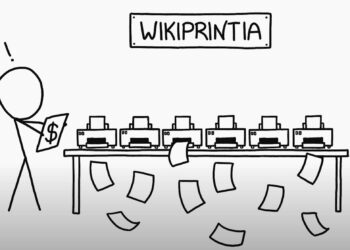
I’ve said a lot of inappropriate things at conferences. At one, I dropped the f-bomb. At another, I even threw a chair. Most of these events–thankfully–took place a long time ago, before video recording speaker presentations was considered normal and routine. Personally, I cringe just thinking about these gaffes, but I take some solace knowing that they are not archived somewhere on the web for posterity’s sake. Most likely, they have been long forgotten by those in attendance, with the exception of the chair-throwing, of which I still get reminded on a regular basis. No one quite remembers why I did it, and the versions I hear are typically so embellished, they sound more like the Geraldo Rivera brawl than a scholarly conference.
Videos from the 2014 STM-Spring Conference were posted recently allowing me to revisit a very memorable talk by Science journalist, John Bohannon. Perhaps “memorable” is not the correct word, because, after several months, I couldn’t recall exactly what John said that upset the audience, only that many attendees were quite offended by his tone and tact.
His talk begins with with an opening line that sets himself off from his audience:
I expected to be sued by some or all of you, and it’s quite a surprise to be invited to speak to you.
The next seventeen or so minutes of the talk outlined his infamous sting of fraudulent open access publishers, in which he documents widespread deception among scientific journals promising rigorous peer review and publication services. None of this goes beyond his paper or the strident reaction he received.
The part of Bohannon’s presentation that caused the most commotion came from the last two-minutes of the talk when he began editorializing extemporaneously about the publishing industry. As someone who isn’t even a publisher, these few words put me on the edge of my chair, and I clearly remember wishing that he’d simply sit down and save himself. Beginning at 17:40:
I think you know that your industry, in the eyes of scientists, is absolutely corrupted. It seems to now hold science itself in contempt often–not just do a poor job but actually hold your stated mission of being in the service of knowledge and stewardship of science in contempt–openly in contempt! Those who pay attention, that is, most are dimly aware and don’t care. But the people who do care—and you’ve heard their voices—are just furious.
He continues by lambasting the audience for being part of the problem:
My sting is nothing. That reputation [of sham publishers] had been established solidly before I got into this. And it’s not just, you know, these guys in India and Nigeria trying to make a buck. It’s the big dogs. You guys know exactly who you are. You know what’s going on.
And then implying that publishers have willfully disregarded their ethical responsibilities over profits:
And my theory is that academic publishing has drifted so far from its original idealistic roots with scientists taking care of the whole last step in the scientific process, from experiment to sharing the news about it, [that] in this world of the Internet and expensive publishing processes, basically a cottage industry grew up that has now grown into a massive multi-billion dollar industry that has become estranged from the ideals, that were probably naïve to begin with. But you can be idealistic and do a good job and make a profit. That is not mutually exclusive.
Bohannon concludes the talk by presenting himself (and Ivan Oransky from Retraction Watch) as ethically-bound journalists, willing to go to jail to protect the names of industry whisle-blowers.
In the question session, John received a rebuke from Fred Dylla (AIP) who was clearly offended. Chatter at the reception returned again and again to Bohannon, recounting the session and its aftermath: “I can’t believe he said that!” “Did he say that?” “No, I don’t believe he said that, exactly.” “I really don’t remember.”
Just hours after the talk, few of us could remember exactly what John said, only that he said some offensive things. In the retelling of the event, the narratives began to evolve and multiply, and in that cloud of ambiguity and missing pieces, our minds filled in the blanks.
I was able to return to Bohannon’s talk because it was recorded. I didn’t have to rely on my faulty memory. In reviewing his talk; however, I’m less offended than I thought I was. John is poised, fearless, well-spoken. Yes, he goes over the edge, but you want some of that in a speaker, and no, he didn’t throw a chair. In this case, a fixed recording of his talk was a benefit–for me, at least; Bohannon may feel otherwise–as I could return to the Version of Record rather than relying on secondary sources (colleagues) or my own recollection of events.
Conference organizers like to think that they are doing non-participants a favor when they record and post their talks. However, as a speaker, I find myself reading my talks these days rather than delivering them extemporaneously. I’m prone to veering off-topic and making snide remarks. On occasion, I can be downright offensive. So, when I see that camera pointed at me, my head goes down and I start reading, which is my defensive posture–a safe mode designed to minimize risks.
But why travel to a conference, pay registration and lodging expenses, if you’re going to watch someone read? Why spend several days of your week, away from work and family, if you can watch the video or follow tweets from audience members, some of whom are not even present in the room? As a presenter, why put up slides when you know people are taking pictures and posting them? For all the wonderful things that social media has offered us in the last few years, we have to acknowledge that they are really interfering with the in-person meeting.
Perhaps we should keep recording technologies out of the conference hall, and retain this space as the last bastion where people can speak openly, where novel claims can be made without fear that they will be tweeted, retweeted, and blogged in real-time, and where people have the freedom to take a little risk.
The Internet is insinuated into so many of our daily routines. It’s time to defend some communal space.
Discussion
18 Thoughts on "Did He Just Say That?! The Perils of Video Recording the Conference Presentation"
Bohannon’s unhappy remarks exemplify what happens when a social movement attacks an industry, something I have tracked many times. The movement seeks the moral high ground so it vilifies those people who have dedicated their lives to the industry’s mission, in this case scholarly communication. Movements need enemies it seems. It is sad but standard and there is little the industry can do to stop it. Meanwhile the good work must go on.
your comment seems to me a classical “bury-your-head-in-the-sand strategy”, will see how it works …
In some ways, Bohannon is right. But his blanketed description (or insinuation) that the entire industry is corrupted, is fundamentally wrong. There are in fact some elements common to most publishers that may be corrupted, or better said imperfect, such as the traditional peer review system, simply because humans are fallible and the system is porous. But not because the publisher is decidedly corrupt. Only because the support structure is weak and because in essence, there is a higher likelihood of corrupt scientists supporting a corrupt system. Also, may I be so bold as to level a claim against Bohannon? He is one of the corrupting elements of the publishing industry, which makes his claims rather ironic. Bohannon manipulated a text hundreds of times, used hundreds of fake names and fake affiliations and e-mails to “trick” publishers, some of which might not have been or are not corrupt (academically or otherwise). In other words, he used dishonest methods to prove the dishonesty of several OA publishers. He lied and broke the rules of submission, caused anguish among honest editors and publishers and may even have caused economic and other damage to others. All in the name of a sting. The only reason he was invited to give a 15-minute summary + a 2-minute ragging of the industry was because of his star fame. Nothing else. He may have raised awareness, and he may have proved some points, but his chosen methodology to achieve it is non-academic and is dishonest. A year later, it still astounds me that Science has had no ethical problems with his methodology.
I have done sessions and short courses at a few conferences and I try to be fairly casual and appear off the cuff, even if I have practiced my points a million times on the plane to the conference destination. I have never done this while being taped and I the idea is a little terrifying. If you flub (chair throwing not included) and there are 30 witnesses, you can talk yourself out of being embarrassed. Knowing it will live on forever in video? That is a whole other story.
I have done interviews for TV to include a 30 minute one-on-one interview. This has a completely different feel to it than speaking in front of a group where you are simultaneously playing to a live audience and taped. As terrifying as that may be, it should make people better speakers. Maybe you didn’t know that you say “so” after every breath.
Anyway, I get why conferences want to tape sessions but I have never gone back and watched a taped session. I agree that watching someone read is a bore but that should be overcome by the speaker. There are very smart people who have a lot of great information to share. Not all of them are actually good at presenting. On the flip side, there are dynamic speakers who don’t know a damn thing.
I’m glad to hear that I’m not the only one who never watches his recorded presentations. I find it excruciating for some reason. I probably ought to watch them, so that I can see how I need to improve, but I just can’t.
About the perils of recording everything, see: http://www.amazon.com/The-Circle-Vintage-Dave-Eggers/dp/0345807294/ref=sr_1_1?ie=UTF8&qid=1405431550&sr=8-1&keywords=the+circle
I think there’s something to be said for putting presentations online, live-tweeting, etc: it affords those who couldn’t otherwise participate (because of money, because they can’t get the time away from work, and so on) a chance to do so.
Having had limited travel funding in my previous positions, I’ve been particularly grateful when conferences I couldn’t afford to attend put up videos, or when attendees choose to tweet sessions I’m interested in.
That said, I agree with your points about the advantages of closed spaces to speak freely.
Video is definitely a mixed blessing. In this case, what it doesn’t allow you to experience is the buzz that John’s remarks (and those of the other panelists) created among the delegates afterwards. Certainly most of us felt uncomfortable during his talk, but that isn’t necessarily a bad thing – to misquote Robert Burns, it can be a gift to (sometimes, anyway!) see ourselves as others see us. Our publishing processes are increasingly under attack in the media, so my hope is that, rather than putting us on the defensive, talks like this will spur us to make them more sound. (Full disclosure – I was the moderator of this panel.)
It would have been better if his off the cuff remarks had been the subject of his talk, because we have no idea what he means. So far as I know the only corruption he has been involved with is the sting on mostly bottom feeding APC OA journals. So what is his claim regarding corruption? What is the basis for his claim about some, many, or all scientists seeing the industry as “absolutely corrupted”? And how is it that the journals are contemptuous? This is a new one to me, and baffling to boot.
As I said above, I doubt that making your processes more sound will blunt these attacks. I have seen other industries try this and it seldom helps, because once a social movement gets you in its sights reality matters little. I recommend defending yourselves rather than agreeing that things need to change.
“It would have been better if his off the cuff remarks had been the subject of his talk, because we have no idea what he means.”
Really?
You may not agree with his points, but claiming not to know what they are seems disingenous. If you really don’t know about researcher anger with publishers, I refer you to Academic publishers have become the enemies of science.
I’ve seen two major changes at meetings (mostly life sciences and medical meetings) over the last 20 or so years.
First, challenging questions from the audience seem to have disappeared. As research funding has dwindled, researchers have become more and more cautious about publicly criticizing one another. The speaker you’re calling out may sit on your next grant committee or the hiring committee for your postdoc. There’s a growing conservatism about what one says publicly about the work of one’s colleagues. The same phenomenon has hindered the growth of post publication peer review, article comments, etc.
Second, as social media has grown in usage, it has become increasingly rare for researchers in my fields to talk about unpublished data during a meeting. Different meetings had different policies, but anything said at meetings like Gordon Conferences or CSHL Meetings were officially to be considered “personal communication” and you needed the speaker’s permission before sharing anything said with the world. This has changed with the rise of blogging, and then Twitter. Now anything stated can be assumed to be instantaneously broadcast worldwide (see the controversy CSHL had in finding the right balance for their journalist/social media policy (http://embargowatch.wordpress.com/2010/05/24/can-you-tweet-from-cold-spring-harbor-laboratory-meetings/).
The end result is again, a creeping conservatism, and very few are willing to go on the record with fresh, unpublished data, and instead speak solely about already widely released results. As others have noted here, the benefit is that those who can’t afford or arrange to go to the meeting get to hear what’s going on. The downside is that meetings are increasingly boring, filled with recapitulations of the papers you’ve already read.
Interestingly, the real action at meetings has shifted to the poster sessions. Here, where you’re talking one to one with a colleague, most people feel they can speak freely without fear of rebuke or broadcast to the world. For a lot of the meetings I attend, the talks are not worth the bother, but the posters are hopping.
Then again, should technologies like Google Glass become the norm, I suspect the feeling of freedom at poster sessions will fade away as well.
Speaking of media attacks, here is another and it is not just about the retraction scandal, in fact it is all over the map.
http://online.wsj.com/articles/hank-campbell-the-corruption-of-peer-review-is-harming-scientific-credibility-1405290747
Here is the second paragraph: “Acoustics is an important field. But in biomedicine faulty research and a dubious peer-review process can have life-or-death consequences. In June, Dr. Francis Collins, director of the National Institutes of Health and responsible for $30 billion in annual government-funded research, held a meeting to discuss ways to ensure that more published scientific studies and results are accurate. According to a 2011 report in the monthly journal Nature Reviews Drug Discovery, the results of two-thirds of 67 key studies analyzed by Bayer researchers from 2008-2010 couldn’t be reproduced.”
Of course peer review has nothing to do with replication, but never mind that, right?
My guess is there are between 5 and 10 million peer reviews a year, but it only takes 4 or 5 anecdotes, some way off base, to generate broad claims of wholesale corruption that is hurting science. This is what social movements feed on, and there is plenty to go around.
Peer review itself may not have any directly to do with replication, but it does have something to do with replicability. The point I think the author was making is that when peer review is lax, it’s easier to publish bad research — which is to say, in many cases, research “results” that can’t be replicated.
You are more generous that I am. To me this looks like the sort of hyperbolic scaremongering that tends to occur frequently during social movements.
Prinz et al. (the paper in question) certainly note publication bias as a factor. John Ioannidis is also essential reading on the general subject.



